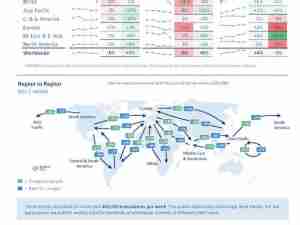United Profit Exceeds Analysts’ Estimates on Cost Reductions
By: | Jul 19 2016 at 07:29 PM | Air Cargo
United Continental Holdings Inc.’s second-quarter profit exceeded analysts’ estimates as lower fuel and operating costs overcame weak fares.
Adjusted earnings of $2.61 a share beat the $2.56 average of analyst estimates compiled by Bloomberg. United said Tuesday it plans to trim growth for 2016 and now sees full-year capacity increasing no more than 1.5 percent from last year, compared with the previous plan to expand by as much as 2 percent.
United is joining efforts by American Airlines Group Inc. and Delta Air Lines Inc. to curb an overabundance of flights and seats, which has put pressure on fares and hurt airline shares. Passenger revenue for each seat flown a mile, a benchmark financial gauge known as unit revenue, has been falling for more than a year.
“We see industry capacity cuts helping unit revenues in the fall,” S&P Global Market Intelligence analyst Jim Corridore said in a note after United announced its results.
‘Underwhelming’ Outlook
Unit revenue dropped 6.6 percent in the second quarter and will fall 5.5 percent to 7.5 percent in the current three-month period, the Chicago-based carrier said in a statement.
The outlook is “underwhelming,” Jamie Baker, an analyst at JPMorgan Chase & Co., said in a report.
United’s second-quarter revenue was $9.4 billion, in line with analysts’ estimates. Net income excluding special items declined to $863 million, the carrier said. Excluding special charges, operating expenses fell 6.1 percent as fuel costs tumbled.
Shares fell 0.6 percent to $47.55 at 6:40 p.m. in New York. While United has rallied since hitting its 2016 low point on June 27, the stock is still down more than 16 percent this year through Tuesday’s close.
Share Buyback
United’s board authorized a new $2 billion share buyback plan with no set timetable. The program is in addition to its almost completed $3 billion repurchase effort announced last July.
The cutbacks in 2016 growth will come from throughout United’s network, with specific reductions to Saturday capacity in the U.S. and to flights between Washington’s Dulles International Airport and some U.K. markets. Flights between Washington and Manchester will become seasonal starting this winter, instead of year-round, and flights to London’s Heathrow Airport will use a smaller jet, Chief Revenue Officer Jim Compton said on a call with reporters.
The company has not seen any significant effects yet from the British vote to leave the European Union, Compton said.
